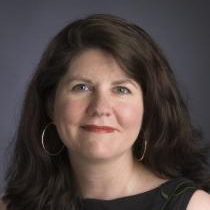Colette Shaw

Staff Highlight: Colette Shaw has worked in Student Affairs at RIT for ten years, serving in First Year Enrichment, Academic Support and Student Conduct and Conflict Resolution. She might be most recognizable for her volunteer work with RIT’s Gray Matter discussion series, where the community comes together each month to explore critical questions.
Read her perspective on a few critical thinking questions….
1. How do you teach applied critical thinking?
I strive to ask beautiful, challenging questions. I spend time before every disciplinary hearing, Gray Matter and class I teach trying to craft questions that invite messy, productive thought. If I’m hitting the mark, I almost never walk out of those conversations without having learned something new myself. Inevitably, I’ll have to chew on the new information and develop more questions. The monthly discussions at Gray Matter open my eyes to the countless perspectives our community brings, and it’s the perfect place to be humbled.
2. Why do you think applied critical thinking is important in your domain?
Students spend a majority of their life outside the classroom, surrounded by opportunities to hold what they’re learning academically up to the complexities of their lives. When else in our lives are we surrounded by so many chances to try on different philosophies or identities, take a critical look, and reexamine ourselves? Student affairs has the responsibility to help students be more conscious about their experiences and identify how their learning can contribute to making the world a little better. In the classroom, I love using case studies. In life, we can shine a light on the case studies right in front of us.
3. Can you share a story where quality applied critical thinking was key to your success?
Prior to coming to RIT, I worked at a liberal arts college at which we introduced a campus-wide out-of-class curriculum with critical thinking as one of its core goals. Student residential communities, clubs and staffs built regularly scheduled reflections into their processes. When conflicts arose, there were immediate opportunities to ask, “How did we get here?” “How do we want to be?” “What do we need to do?” Every member of the community was empowered to ask critical questions, so the feeling of walking on eggshells when there was disagreement was reduced and individuals expected uncomfortable conversations as part of campus citizenship. In many ways, Gray Matter provides that space at RIT. Right after the 2016 election, I got calls from colleagues asking “When are you going to get something on the calendar? People expect to talk.” I dream of a time when the whole world is a giant Gray Matter discussion.
4. How do you use critical thinking in other areas of your life outside of RIT?
Satirists like Dave Chappelle, Tina Fey and John Oliver inspire me to look at the world through a lens of irony but remind me I shouldn’t take myself too seriously. I would love to work at a university where all my favorite comedians populated the faculty and staff. In the meantime, I love watching, reading and even making clumsy attempts to write comedy.
5. Any last critical thoughts?
Why don’t shoppers return their carts to the corrals?